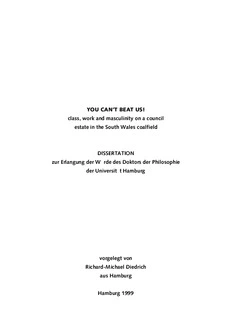
R Marques - Harvesting Hunger in Angola Diamond Fields - WoMin PDF
Preview R Marques - Harvesting Hunger in Angola Diamond Fields - WoMin
YOU CAN’T BEAT US! class, work and masculinity on a council estate in the South Wales coalfield DISSERTATION zur Erlangung der Würde des Doktors der Philosophie der Universität Hamburg vorgelegt von Richard-Michael Diedrich aus Hamburg Hamburg 1999 1. Gutachter/in: Prof. Dr. Roland Mischung 2. Gutachter/in: Prof. Dr. Rolf Wirsing Tag des Vollzugs der Promotion: 2. Februar 2000 Richard-Michael Diedrich YOU CAN’T BEAT US! class, work and masculinity on a council estate in the South Wales coalfield PhD Thesis, Hamburg 1999 revised: Hamburg 2000 to Siri Hannah Contents Acknowledgements .....................................................................................................IX 1 You’ve come to the right place: introduction.......................................................................................................................1 “The bottom end of the mining villages”? Opening up perspectives......................................2 “I don’t like academics because they demolish our heroes”: some thoughts on fieldwork and the problem of representation.........................................................................5 “Put that in your book”: outline..........................................................................................10 2 Wild women in cowboy country: theoretical reflections on hegemony and working class culture.........13 Miners and the imagination of the working class.................................................................15 Them vs. us: similarity, difference and ideological closure....................................................20 “It’s simple, really!”: the experience of hegemony...............................................................24 Respectability and the working class....................................................................................29 3 You can't beat us: the struggle for hegemony in the South Wales coalfield.......................39 “If you don’t give people hope they haven’t got a life”: the social imagination of survival and resistance..................................................................................43 “When a pit dies…”: The decline of the coal industry..........................................................47 “We spread our wings and then started going out”: fighting pit closures in the 1980s........50 Margaret Thatcher and ‘The Last Crusade’..........................................................................56 Eternal Vigilance…: the last deep mine in South Wales........................................................63 4 Just chucked them all together: power and resistance on a council estate.......................................................75 The making of a ‘community’?............................................................................................75 “This is a poor community”: the discourse of survival..........................................................79 The rough and the respectable or how to create a slum.......................................................83 “it’s like a slum and he don’t do his garden”.......................................................................87 “There’s a hell of a change down here.”..............................................................................95 “They don’t know what it’s like”: the ‘them’/’us’-dichotomy in Welsh working class culture.................................................100 5 The heart and soul of the village: maintaining the fragile local hegemony.........................................................107 Consuming passions: drinking and male sociability.............................................................107 Talking shop: the collective identifications of work.............................................................113 From confidence to crisis: the changing role of the working men’s club.............................114 The lost way or “You can’t even get them there today”....................................................119 It's a man's world: becoming a miner, a man and a member..............................................124 “You need rules or everything would end up in chaos”: the work of the club committee.........................................................................................129 6 If you got a ship you got to have one captain: challenging the male hegemony........................................................................139 “We’re not used to working with women”: subordinate and threatened masculinities.......142 “She’s got one of these bloody problems”: Challenging the male hegemony 1.................147 “They’re living in a dark age”: Challenging the male hegemony 2.....................................159 “It’s just gonna be hell there”: Defending the male hegemony..........................................165 “And you can start living your own life and becoming your own person”: Undermining the male hegemony......................................................................................173 7 Empowering the marginalised? power(lessness) and hegemonic masculinity...............................................181 “We have moved forward!” Postscript, May 2000............................................................187 Bibliography .................................................................................................................191 Acknowledgements In the course of the research I have become indebted to a number of different people. First of all I would like to thank the people on the council estate and at Tower Colliery. Without their hospitality and their friendship I could not have done fieldwork and written this book. The experience of sharing a short period of their lives with them has shown me different ways of making sense of the world. Although I do not always agree with their ways I learned to respect them — and they certainly initiated a process of reflection about myself and what I was doing. I am grateful that I had the chance to meet such remarkable people. However, after I had finished my MA thesis on Welsh identities in 1992, I wanted to continue working on ethnic identity and nationalism in a Welsh context. However, when I discussed the project with Anthony Cohen at Edinburgh he came up with the idea to study the effects of economic restructuring in a former industrial area. His suggestion became the starting point for this research project and I am grateful for his advice and understanding in difficult times. I also wish to thank the staff at the Department of Sociology and Social Anthropology of the University of Wales, Swansea — particularly Reginald Byron, Charlotte Aull Davies, and Richard Jenkins — for making my infrequent excursions out of the field and into the academic world an intellectually inspiring and enjoyable experience. The production of an ethnography can sometimes be a pretty arduous task. A number of people helped me survive the lonely hours of writing anthropology. I am particularly grateful to Dorle Dracklé, Helge Ludwig, Susanne Schwalgin and Cordula Weißköppel for reading numerous drafts of this book. Their critical suggestions have enabled me to clarify my thinking and to improve the text in many ways. Special thanks to Penny Scott who shouldered the burden of proof-reading the never-ending manuscript. Last but not least, the research project could never have been accomplished without the financial support of a number of organisations. I thank the Department of Social Anthropology of the University of Hamburg that granted me paid research leave and the Deutscher Akademischer Austauschdienst (DAAD) for providing additional funding for the fieldwork. However, without the financial assistance of the Heinrich Böll Stiftung, Berlin, that awarded me a postgraduate scholarship, I could not have turned my fieldwork data into a book. Hamburg, October 2000 R-M Diedrich Ammanford Ystradgynlais Merthyr Ebbw Vale Tydfil Hirwaun Tower Penywaun Abertillery Pontarddulais Fernhill MAarbdeyrdareCynonD Vaelleeyp Llanelli Neath Rhondda FRawhrondda FacDhuffryn Penrhiwceiber Lady Swansea Windsor Abercynon Port Maesteg Tymawr/Lewis Merthyr Talbot Pontypridd Newport Bridgend Cardiff Barry Colliery mentioned in the text Boundary of coalfield Map: The Fieldwork Area and the South Wales Coalfield South Wales Coalfield
Description: